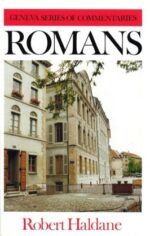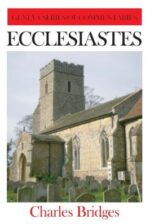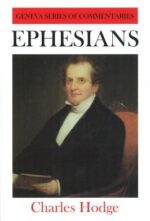Related products
-
Romans (Robert Haldane)
$34.00‘Dr. Chalmers styled this “a well-built commentary”, and strongly recommended it to students of theology. In his “Sabbath Readings” he writes: “I am reading Haldane’s Exposition of the Epistle to the Romans, and find it solid and congenial food.”‘ — C. H. Spurgeon
Robert Haldane’s Exposition of Romans, both in its contents and in the power of its influence, stands among the foremost of the many treatments of the epistle. As a commentary, Thomas Chalmers ‘strongly recommended’ it; Spurgeon put it in the front rank, and more recently, Martyn Lloyd-Jones owed ‘much profit and pleasure’ to it, characterizing its contents as unsurpassed in ‘warmth of spirit’ and ‘practical application’.
-
Ecclesiastes (Charles Bridges)
$20.00‘The Scriptural method of exposition so well carried out by Bridges renders all his writings very suggestive to ministers. While explaining the passage in hand, he sets other portions of the word in new lights.’– C. H. Spurgeon
Charles Bridges’ commentary on Ecclesiastes shows that this neglected book of Scripture is as relevant for today as it has ever been. Surely, America needs to be awakened to the futility of seeking happiness apart from knowing the Lord.
Ecclesiastes is a book that has seemed mysterious to many; but when its overall theme is kept in mind, it becomes much clearer.
-
Ephesians (Charles Hodge)
$22.00The great virtue of Hodge on Ephesians is his ability constantly to communicate the sense and overall argument of a passage. A peerless teacher, his aim, with the pen as in the classroom, was ‘the simple exhibition of the truth which God had revealed’- his own description of Paul’s preaching.
One of the outstanding Geneva Series commentaries.
“Hodge is most valuable. With no writer do we more fully agree.” — Charles H. Spurgeon




Proverbs – Geneva Commentary Series (Charles Bridges)
$35.00
By far, the most valuable and informative commentary on the book of Proverbs, dealing in great detail with each verse and drawing practical lessons from all.
“The best work on the Proverbs”, was C. H. Spurgeon’s verdict on this commentary. “While explaining the passage in hand, he (Bridges) sets other portions of the word in new lights.”
In stock
Proverbs
Geneva Commentary Series
By far, the most valuable and informative commentary on the book of Proverbs. It deals in great detail with each verse, drawing practical lessons from all.
“The best work on the Proverbs”, was C. H. Spurgeon’s verdict on this commentary. “While explaining the passage in hand, he (Bridges) sets other portions of the word in new lights.”
About the Author
Charles Bridges (1794-1869) was one of the leaders of the Evangelical party in the Church of England in the nineteenth century. He was the vicar of Old Newton, Suffolk, from 1823 to 1849, and later of Weymouth and Hinton Martell in Dorset.
Educated at Queen’s College, Cambridge, Bridges was ordained in 1817. As a preacher he was called upon for such important occasions as the Clerical Conference at Weston-super-Mare in 1858 (when he preached along with J. C. Ryle) and the consecration of the Bishop of Carlisle in York Minster in l860.
Renowned though he was in his own day for his pulpit ministry, his subsequent fame rests in the books which came from his pen – An Exposition of Psalm 119 (1827), Forty-eight Scriptural Studies (5th ed. 1833), Fifty-four Scriptural Studies (1837), An Exposition of the Book of Proverbs (1846), a Manual for the Young (1849), and An Exposition of the Book of Ecclesiastes (1860). His The Christian Ministry went through nine editions within 20 years of its appearance in 1829. It has probably remained unequalled in its field. These works earned high commendation from many, including C. H. Spurgeon, who described all Bridges’ writings as ‘very suggestive to ministers.’
After his death a small selection of his correspondence was published in book form in 1870. The writings reveal a man of deep Christian piety. ‘I never remember anyone,’ says the writer of the Foreword to The Christian Ministry, ‘in whose presence it was more difficult to be irreligious, or even frivolous.’
Cloth over Board
Charles Bridges
660
Banner of Truth
5.75 x 8.8